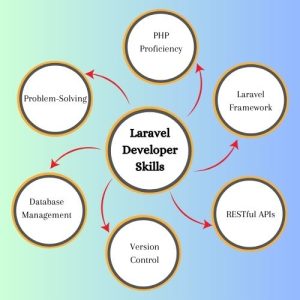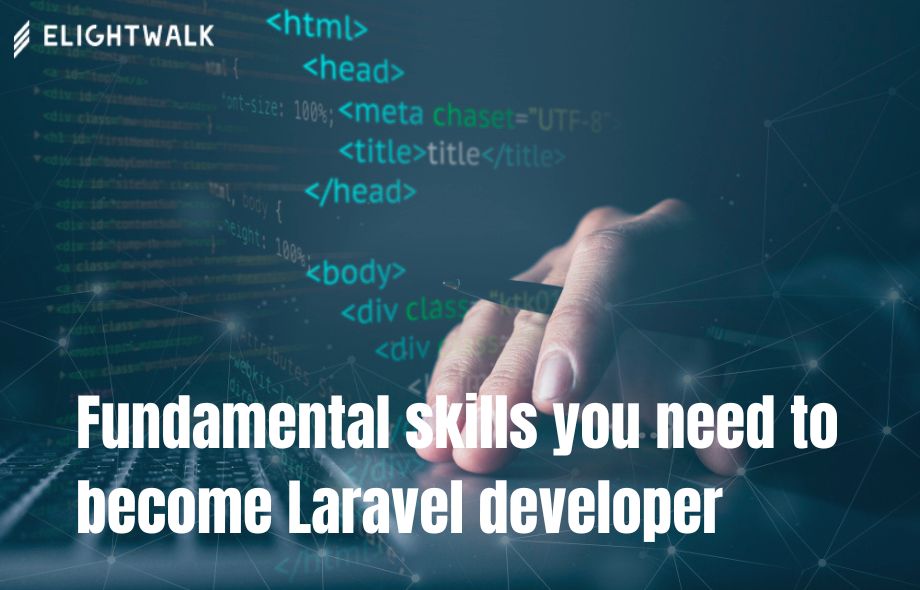Becoming a Laravel developer requires a solid grasp of essential web development skills. From understanding PHP basics to unraveling Laravel’s MVC structure, mastering these fundamentals is crucial for success. In this guide, we’ll break down the key skills you need to kickstart your journey as a Laravel developer, making the learning process easy and accessible.

Laravel developer Skills
PHP Proficiency:
The Laravel framework is a PHP-based framework that allows quick web application development. PHP is a scripting language used primarily for server-side web development. It can create both static and dynamic web applications. It is also used for general-purpose programming and can be embedded into HTML. To become a Laravel developer, you must first learn PHP.
Laravel is a PHP framework, so you must know PHP syntax, object-oriented programming (OOP) concepts, and standard PHP functions. This includes familiarity with data types, variables, functions, control structures, and object-oriented programming concepts.
Laravel Framework:
Train yourself with Laravel’s features such as routing, MVC architecture, Eloquent ORM, Blade templating engine, middleware, and artisan command-line interface. Understanding these components will enable you to build robust web applications efficiently.
Eloquent ORM (Object-Relational Mapping):
Laravel’s Eloquent ORM simplifies database interaction. Understanding how to use Eloquent for CRUD (Create, Read, Update, Delete) operations, relationships (one-to-one, one-to-many, etc.), and database migrations is necessary. It is a powerful tool for managing database records in Laravel applications.
Laravel Routing:
Routing defines how URLs map to specific controller actions. Understand how to define routes, handle different HTTP methods (GET, POST, PUT, DELETE), and pass parameters through routes.
Laravel Blade Templating Engine:
Laravel uses Blade to create dynamic views. Mastering Blade syntax, including control flow directives, loops, and conditionals, and working with data passed from controllers is essential.
Laravel Artisan:
The Laravel Artisan CLI (Command Line Interface) is a robust tool for generating code, running migrations, managing environments, and performing other tasks.
RESTful APIs:
Understand the principles of RESTful API design and learn how to build and consume RESTful APIs using Laravel’s built-in features like API resources, routes, controllers, and middleware.
Database Management:
Knowledge of SQL queries and database concepts is essential for interacting with databases effectively. Work with database models, perform CRUD operations, define relationships between models, and use Eloquent’s query builder for complex queries.
Version Control (Git):
This is vital for collaborative development and code management. Learn how to use Git for version control, including basic commands like commit, push, pull, branching, and merging.
Testing:
Learn about testing methodologies and write unit tests, integration tests, and feature tests using Laravel’s testing framework, PHPUnit.
Deployment:
Learn about server environments, web hosting, and deployment strategies for deploying Laravel applications to production servers. Understand concepts like server configuration, file permissions, and deployment workflows.
Problem-Solving Skills:
Develop strong problem-solving skills to troubleshoot issues, debug code, and solve technical challenges during Laravel development. Work effectively under pressure and meet deadlines.
How do you handle version control and deployment processes in Laravel projects?
Git is commonly used in Laravel projects to manage version control. Developers change a repository hosted by a platform such as GitHub or GitLab. They frequently use deployment tools like Envoyer or Deployer and integrate with CI/CD services like GitHub Actions or Jenkins. Environment-specific configurations are controlled using .env files, while deployment scripts handle operations like fetching code, running migrations, and restarting servers.
Conclusion
Becoming a Laravel developer is an exciting journey filled with opportunities for growth and innovation. By honing your skills in PHP, mastering Laravel’s MVC architecture, and continuously learning and adapting to new technologies, you’ll be well-equipped to confidently tackle the challenges of modern web development. Remember, persistence and dedication are key. As a Laravel developers, keep building and learning to advance your expertise and open doors to exciting career opportunities in web development.



 :
:









